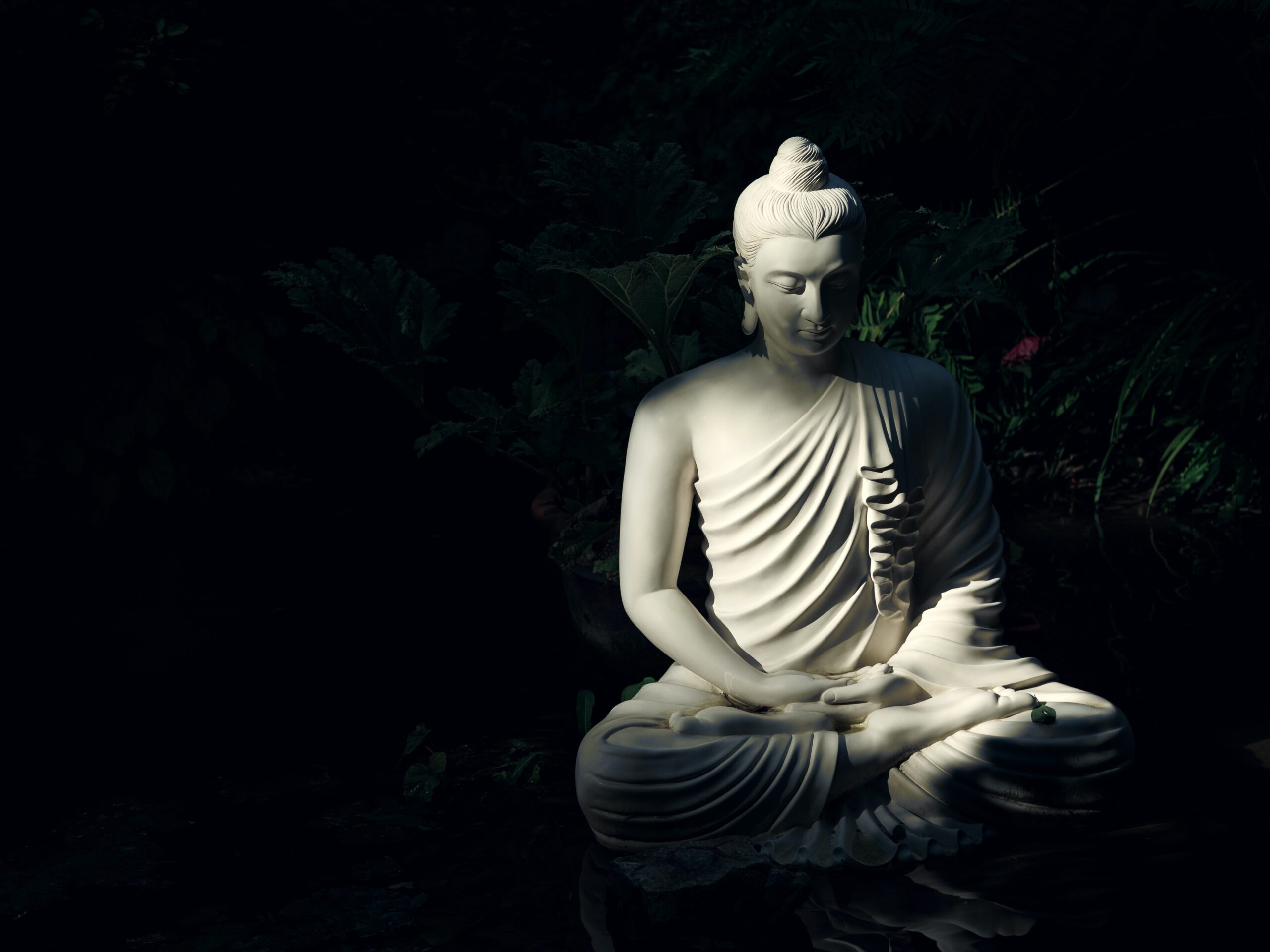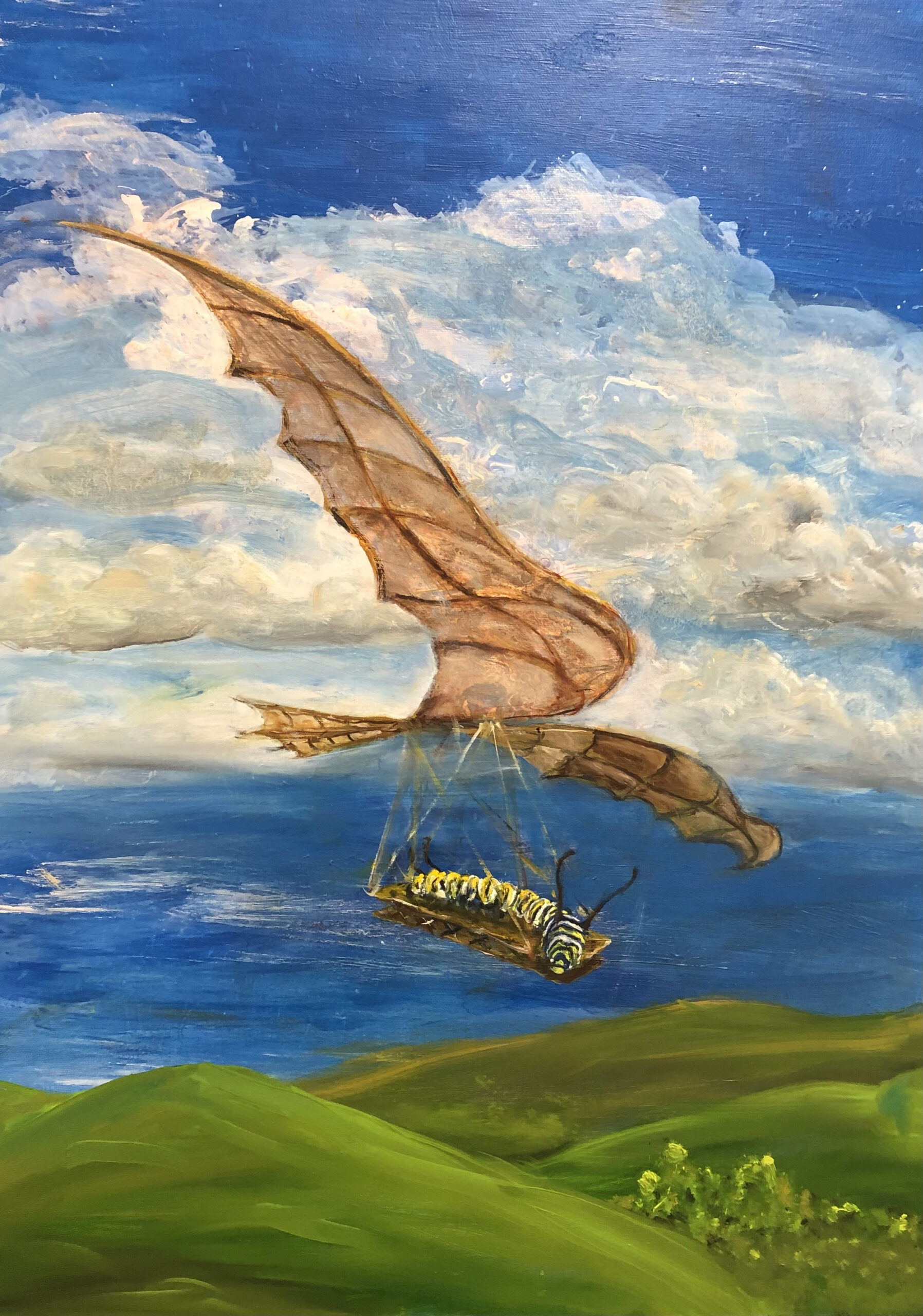Visual Art: Summer’s End
What happened to the fun part?
~ Jim F

What happened to the fun part?
~ Jim F


I was born in San Francisco a month after the first printing of the first edition of the Big Book was made back East. Thirty-seven years later when A.A. was 41 years old, I crash-landed into my first A.A. meeting in Washington, D.C. and took my last drink the next day. I have been sober over half my life and half A.A.’s life.
Practicing the guidance of the statement on page 85 of the Big Book, “We are not cured of alcoholism. What we really have is a daily reprieve contingent on the maintenance of our spiritual condition,” has evolved for me over the years. Today it is for me, ‘We have a daily reprieve based on the maintenance and continued growth of our spiritual condition through relaxed, repetitive practice of spiritual principles in all our affairs.”
How do I do that?
I can best summarize it at this time of my life and sobriety in four words from A.A. literature: Choice, Desire, Enjoy, and Practice.
Choice
Choice is the first benefit of sobriety that came to me in my first week in A.A. I knew that with A.A. I had the choice not to drink the poison that is alcohol. The first place in A.A. literature that I encountered choice is on page 12 of the Big Book, where Ebbie Thacher says to his old drinking buddy Bill Wilson who was in his last drunk, “Why don’t you choose your own conception of God?”
I later saw that the entire A.A. program gives me choice, the Twelve Steps, Twelve Traditions, Twelve Concepts, and age-old wisdom throughout A.A. literature, especially the Serenity Prayer authored by Roman General and Emperor Marcus Aurelius in his private ‘Meditations’.
Desire
“The only requirement for membership is a desire to stop drinking,” the Third Tradition states. When I pursued desire with alcohol in me, I got into a whole lot of trouble. Without alcohol and with the guardrails of the entire A.A. program, desire becomes a call from Greater Power to wake up, show up, be present, and listen to others on how they are staying sober. I can learn from anybody inside and outside of the program, those who stay sober and those who don’t, because the Third Tradition is A.A.’s great statement of equality. As A.A. ‘s brochure from GSO in New York on Sponsorship says, “In A.A. sponsor and sponsored meet as equals, just as Bill and Bob did.”
Enjoy
Page 132 of the Big Book states, “We absolutely insist on enjoying life.” Page 83 promises, “We are going to know a new freedom and a new happiness.
Practice
Practice is the final action word in the Twelve Steps. Everything of value that has come to me in life has come from relaxed, repetitive practice of positive attitude, action and habits. Today, I seek to practice on a daily basis the spiritual principles underlying the Twelve Steps, Traditions, Concepts, and beyond. My list has grown to 25 principles to practice. The first three are: humility, equality, and community. The last three are: courage, hope, and gratitude.
I didn’t limit my drinking and I don’t limit my sobriety. I continue to re-read with others all five A.A. books that Bill Wilson wrote and published in his 36 years of sobriety: Alcoholics Anonymous © 1939, The Twelve Steps and Twelve Traditions © 1952, Alcoholics Anonymous Comes of Age © 1957, Twelve Concepts for World Service © 1962, As Bill Sees It © 1967, as well as the sixth book of his writings that A.A. published posthumously, The Language of the Heart © 1988.
I use all of the program and beyond to stay sober, just as Bill Wilson did: “In no circumstances should we feel that Alcoholics Anonymous is the know-all and do-all of alcoholism… We are forgetting that to religion and to the medical arts we owe our very existence…Certainly we drunks did put AA together, but all of its basic components were supplied by others. Here, especially, our maxim should be, “Let’s be friendly with our friends.” Pages 332 and 333 of The Language of the Heart © 1988 from an article in The Grapevine in July 1965 that Bill Wilson wrote on A.A.’s 30 th anniversary.
That for me is practicing humility, which Bill called ‘perspective’ and which I like to describe for myself in three sentences: “I don’t know. Others might. I need to listen.”

For years I considered the Big Book statement: “Happy, joyous and free” as a bit redundant, for after all, are not happiness and joy the same? (p. 133) However, years later I found that HAPPINESS and JOY are two completely two different things:
HAPPINESS is a human experience. It disappears when we are sad or depressed. But JOY is a God experience that may take place even when we are sad or depressed.
I have experienced said unexplained joy while feeling deeply depressed in a tent while camping in Sult Ste. Marie, Canada. I had recently been separated from my ex-wife and was feeling enormous depression. We camped in that same tent in the Grand Canyon during our honeymoon previously. In the middle of the night, I became unexplainably full of energy, and everything seemed to wax extremely vivid and bright. I was full of Joy. This lasted throughout the night.
I believe Bill Wilson was experiencing great Joy—not ordinary happiness—after he went through his vital spiritual experience on page 14 of the Big Book: Doctor Silkworth told him: “Something has happened to you I don’t understand. But you had better hang on to Anything is better than the way you were.” I believe Bill’s resultant Joy prompted him to immediately go out and start helping alcoholics. So, I believe God’s Joy can be ongoing!
Then there is Fitz Mayo who had such an ongoing vital spiritual experience that: “He couldn’t drink even if he would.” (P. 57, Big Book) There must have been great Joy in that!
Again, Ebby Thacher (Bill’s sponsor), who was not a spiritual person prayed to God: “as never before” and was stuck sober for two years and seven months. Again, great Joy must have been present. (EBBY The Man Who Sponsored Bill W., by Mel B. – p. 58) Ebby died in 1966, two years sober.
I believe the blessing of spiritual Joy will come to me when God decides to send it—I cannot just wish for it. However, I believe my chances are all for the better if I try to maintain a fit spiritual condition by living the Twelve Steps.

Blessed Lover of my Soul
You have given me all the Gifts
I have only to truly know
That you are always with me
I need never doubt You
Gratitude in Loving others says
I share You with my fellows
There’s no need to hide today
Never ever will I fear life alone
Everyone has You inside them too
We walk this happy path together
It’s our joyful destiny! Please!
Whenever anyone anytime is here
See to it that we have space
To share our wants and needs
We carry God’s Love inside us
Happy to be human beings too
Love’s longing for this experience
Has brought us together do tell
We each rejoice in our little selves

Wait: To stop, to standby.
Wait: To serve, to attend.
WAIT: Anagram for Why Am I Talking?
Yeah, why am I talking? Good question. Don’t wait. See the end of the article as we alkies like to do. Look at the back of the book first. Find out how it turns out.
This morning at the Cabin Meeting, our speaker gave one of the best answers to that critical question we sometimes hear from sponsees, “What about this ‘God thing?’” The Third Step is all about God and how am I going to turn my will and my life over to this ‘God thing?’” “How’s that going to help me stop drinking?”
Well! Here’s an answer for you. “Wait until we get there.” Wait. There’s two steps ahead of that Third Step.
The world is round so we don’t see the full panorama of our lives. If we knew all we had to do in this lifetime, we’d probably drink. And therein lies one of our problems as alcoholics. We want to be in control. We want to know all the answers ahead of time and know the ending so we feel safe.
Waiting is not comfortable. Seems like the human species is not happy being uncomfortable. Even overnight mail doesn’t feel comfortable. We want lightning speed results with mega-giga-bytes to boost them along.
As we wait in the hallways of life, it’s not comfortable there either. We want a door to open just to relieve the anxiety of some seeming inevitable, fearful, negative unknown on its way. Learning how to live out the examination of “wait and see” takes practice. Practice equals progress, not perfection.
To wait, meaning to serve, holds high promise for us as the Big Book uses “Wait” 3 times in the chapters, Working with Others, and a couple of times in To The Wives. To Wait is key when working with others, whether as a sponsor, a wife, a husband, or anyone else.
“The primary fact that we fail to recognize is our total inability to form a true partnership with another human being.” Page 53. BB
Maybe that inability comes from the inability to be patient, to “wait and see.” When we wait at a stoplight, we can use the time to breathe, to practice mindful breathing, and go into an 11th Step. Sometimes a big, fat exhalation provides the means to come into current time and enjoy the life around us, the one we normally speed by; that million-mile an hour trajectory from Point A to Point B we think is so important.
It’s progress when I can WAIT and examine Why Am I Talking? Why am I doing what I’m doing? What is the motive? “Examine your motives,” my sponsor says. Even simpler, “You’re either moving toward a drink or away from one.” Before taking an alluring action, words like these save me from going off the road and into the drink. So to speak.
We can wait as does the poet, John Milton: On His Blindness.
Here was one of the world’s greatest poets who could no longer see. And could no longer write. Someone else scribed for him. In the dark and sightless world, Milton summoned the strength to say, “They also serve who only stand and wait.” Even waiting has value. So, for those who are new and believe you are not contributing enough, as we so often hear, you are serving. Showing up regularly provides great service in ways great and small; visible and invisible. We know the Program works when you maintain your chair and wait for the opening prayers.
To wait on one side and to serve on the other is the natural ebb and flow of Alcoholics Anonymous. It’s a dance we get to enjoy with one another, day-by-day, one day at a time.

By Rick R.
Tackling the alcoholism problem, the wreckage of the past, and trying to be Spiritual at the same time is a large order in the beginning. Most of us are consumed with the trauma left in the wake of a life run by our Egos and flooded with alcohol. We hear a variety of ways to approach the Spiritual way of life and we try to fit it into our A.A. agenda but, still reeling from the wreckage, our effort seemed scattered at best.
If we manage to get a handle on those troubling issues that consume our thinking, it often frees us up to explore the Spiritual aspects of the program at a deeper level. At first, it is not easy to define, or to articulate, the word spiritual but most of us will try to put a face on it based on something we learned in church or something we have heard at an A.A. meeting etc. This is an O.K. start but it is wise to continue to look for that deeper meaning that is consistent with the spirit of the A.A. program and to practice it in our daily lives. As I research the word spiritual, I find many phrases that could define it such as: In the spirit of, Of the inside, Intangible, not of a physical or material nature, Religious, Psychic, and many more.
I have read most of the publications that have come from the list of A.A. approved literature, and in “Doctor Bob and the Good Old Timers”, it suggests that when the Co-founders had to address the issue of spirituality, they got their inspiration from the book: The Sermon on the Mount, by Emmet Fox. (1938) I have found that book to be exactly what I needed to segue into a way of thinking that covers all the principles that A.A. suggests. It explains that we can live by the Letter of the Law, and still not receive the desired results until we learn to live in the Spirit of the Law. This is my Go-to Guide and I frequently reread it to reinforce my Spiritual understanding. I do not go-it alone. There I come to understand that there’s no such thing as a Selfish Spiritual Principle.
We hear talk of prayer and most of us who have been around awhile have found an approach that works for us. If I pray to God, how does God communicate His message to me? I have never heard a voice that I could confirm to be the voice of God. I do, however, receive inspiration in the form that is more than enough for me, and I have a tremendous amount of faith. They speak of a “kind and loving God as He may express himself in our group conscience.” That works for me. The way I have come to explain this concept is as follows: I have sat in on thousands of A.A. meetings and whether I know it or not, my mind is collecting information that I am not even aware of, and storing it away, as in a file cabinet, in those 10 billion brain cells that we are supposed to have in our heads.
When I pray for guidance, the search begins in the file system and comes up with the answer intuitively. This file cabinet metaphor is my way of trying to express a sound and solid approach to being open to outside influences without really having to define who or what God is. He speaks in many ways. Another thing that I believe it does without my personal effort is to neutralize much of my negative way of thinking. Spirituality is an inside quality. It resides in my mind, my heart, and my conscience. To acquire it I had only to stop fighting and practice the rest of the A.A. program as enthusiastically as I could (12&12 page 27) and I might add, Keep it Simple.

Painstaking
As in doing it thoroughly
With great attention to detail,
Taking great pains in the process
It had seemed the triviality of the returns
Did not merit the obvious effort needed.
How had it once been so eloquently put?
“The juice ain’t worth the squeeze.”
If You Are . . . . .Painstaking
Contempt prior to investigation long abandoned
Hope reigned supreme
Defects removed in humility,
Allowed The List to be made
Then came the clearing away
As with a leaf blower in autumn
Only these leaves, once amended, came not back
They were gone, not to return.
No bad penny these, a clean slate
Hope in this new found freedom
Had blown away discouragement
Slowly, new behavior had replaced old habits.
A new outlook swept away despair
At least for this day, this one day, Today.
Tomorrow’s challenges would wait, yesterday’s were gone
I needed only to trudge today, that I could now do.
* * * * *
Our minds try out a lot of things pre-transformation.

By Dede H

The house is rumbling early
Pitter patter of little feet on the floor
My husband is grumbling clearly
A Yorkie is scratching at the door
I’m here writing with my Muse
Yet I am the student of Everything
Each day I ponder gathering tools
You watch me faithfully Knowing
Someday I will figure it out
One day I will give up give in
Stop fighting and forget to shout
This is when I will truly win
I hear You and We write it here
Thank you Higher Power
For Whom I have a Name
A secret I will one day share
Listening to You is my Solvent
I have little need of anything else
My dogs, my ladies and gents
May realize This in themselves
By John W

Who cares to admit defeat
Or that I, not you, caused the harm.
Ignorance is bliss, why sound the alarm?
Still the silent echo screamed: “Be Complete”.
What lengths would I go, to encompass “all”?
“Any” was the vow, could it I keep?
To drink was the alternative, that price too steep,
Unless them it hurt, no amend too tall.